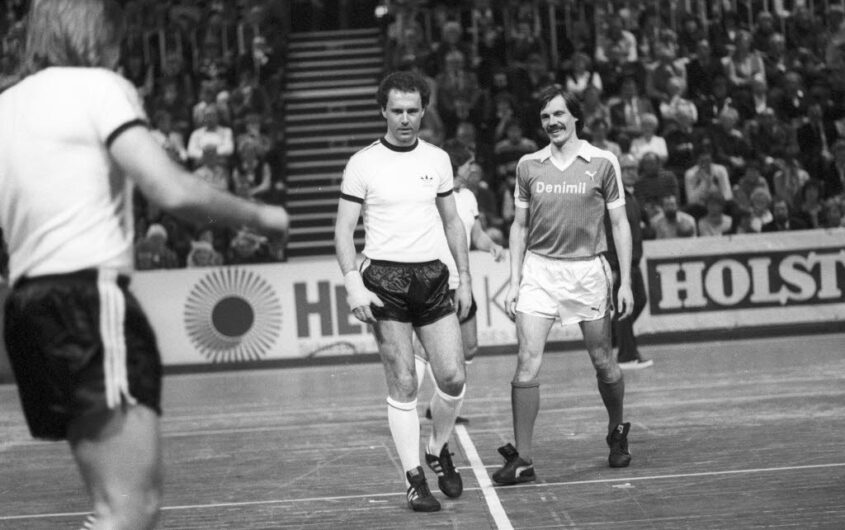
Friedrich Magnussen via Stadtarchiv Kiel on Wikimedia Commons
Franz Beckenbauer (1945-2024)

Matthias Kaelberer
University of Memphis
Dr. Matthias Kaelberer is Professor and Chair of the Department of Political Science at the University of Memphis. He earned his undergraduate degree in Political Science and Philosophy from the University of Tübingen (Germany) in 1987, and his Ph.D. in Political Science from Princeton University in 1997. Before joining the Department of Political Science at the University of Memphis in 2004, he served as an Assistant and Associate Professor at Iowa State University. Dr. Kaelberer specializes in international relations, comparative politics, and political economy. His research has focused on various aspects of European politics and international monetary relations, including the formation of rules for European monetary cooperation, the role of collective identity, community, trust, and democracy in the social construction of Europe’s single currency, the euro, and socio-political discourses at the intersection of politics and soccer in Germany. In 2008, Dr. Kaelberer served as Fulbright Scholar at the German Institute for International and Security Affairs. He also held a four-year term as the editor of the European Studies Journal, was the recipient of the 2011 College of Arts and Science Award for Teaching Excellence and the recipient of the 2014 Helen Hardin Honors Program’s Undergraduate Mentoring Award. Dr. Kaelberer’s articles have appeared in such as journals as the Review of International Studies, Comparative Politics, the European Journal of International Relations, Global Society, European Societies, Contemporary Politics, the Journal of European Public Policy, the International Journal of Politics, Culture and Society, the Journal of Gender Studies, German Politics and Society, the Journal of Social, Political, and Economic Studies, and German Politics.
Germany’s Last “Kaiser” and His Legacies
Franz Beckenbauer was Germany’s most important soccer personality—as a player, coach, soccer executive, and public figure. However, Beckenbauer stood for more than just soccer. His influence was felt far beyond the pitch in German society and as a representative of a new and modern (West) Germany to the rest of the world. Simultaneously, he also embodied the many ambiguities and tensions characteristic of contemporary relations between soccer and society in Germany and beyond.
Beckenbauer was arguably the most brilliant player in German soccer history, and—alongside the likes of Pelé and Johan Cruyff—is considered one of the greatest players of all time. As a player he guided his club (and hometown) team Bayern Munich to four German Championships (1969, 1972-1974), four German Cup (DFB-Pokal) Championships (1966, 1967, 1969, and 1971), the European Cup Winners Cup in 1967, and three successive European Cup Championships (today’s Champions League) between 1974 and 1976. He won the North American Soccer League three times with New York Cosmos between 1977 and 1980, and another German Championship with Hamburger SV in 1982. He was also critical to the international success of the German national team winning the World Cup in 1974—as well as runner-up in 1966 and third in 1970—and the European Championship in 1972 (runner-up in 1976).
Beckenbauer’s soccer success, however, was not limited to his playing career. Shortly after retiring as a player, he became the de facto coach of the German national team. Because he did not have an official coaching license, Germany’s soccer association, the DFB, had to invent a new title for his role—the “Teamchef.” Under his leadership the national team returned to international success, finishing as runner-up in the 1986 World Cup and winning the tournament in 1990. With that success, Beckenbauer became one of only three men—alongside Brazil’s Mario Zagallo and France’s Didier Deschamps—to have won the World Cup both as a player and as a coach.
However, Beckenbauer is unique in also serving as the leading soccer executive and the public face of organizing a World Cup, the 2006 tournament in Germany. As if his playing and coaching career was not enough, the successful hosting of the World Cup further elevated his persona in the public. The visible joy and festive atmosphere of that World Cup left a lasting memory for many Germans, even if later revelations of possible corruption associated with the 2006 World Cup and the awarding of the 2018 and 2022 World Cups to Russia and Qatar clouded Beckenbauer’s public image.
Beckenbauer’s life and career reflected and embodied in unique ways changes that had been underway in Germany.
Beckenbauer’s playing style and technique were unique and remain unmatched in many respects. He is the only player in soccer history to invent a new position on the pitch. He turned the traditional role of the center back responsible for being the last man clearing the ball on defense into that of the “Libero” (the “free man”)—a position that slowly disappeared from the game again after the end of Beckenbauer’s playing career. Not having to directly guard an opposing player, Beckenbauer was ready to start attacks, direct the play, dictate the game, and distribute the ball on offense. The exact origin of Beckenbauer’s nickname “Der Kaiser” remains a matter of debate, but it fit the seeming effortlessness, elegance, grace, audacity, and—his opponents would say—arrogance of his game. He would often take away the ball from opponents in casual fashion. On attack, he rarely had to look down at the ball and kept his eyes on the development of the game. He regularly kicked the ball with the outside of his foot. And he would often dominate the game but would rarely leave sweaty or with a soiled shirt.
His playing style and success would make Beckenbauer the most loved player for some and the most hated player for others. Opposing fans often resented the elegant new style of play that moved the game away from conventional values of hard work, team spirit, physical strength, and traditional masculinity. On the national level, however, Beckenbauer’s playing style stood for a new, younger, more playful, charming, and lighthearted Germany against the historical national stereotypes. At the same time, Beckenbauer and the players of his generation transformed the relationship between German society and soccer. Until the late 1960s, German soccer was largely the preserve of the working class. Although coming from a very modest background, Beckenbauer—alongside his club rival and national teammate Günter Netzer—made soccer popular with bourgeois society. Like no other, Beckenbauer personified that shift, becoming the “free man” both on and off the pitch. Developing a friendship with ballet dancer Rudolf Nureyev, he was at ease in the company of rocker Mick Jagger at the same time as he was a star guest in the opera houses of Bayreuth, Vienna, and New York.
Thus, Beckenbauer’s life and career reflected and embodied in unique ways changes that had been underway in Germany. The socio-political upheavals of the 1960s created a dramatic shift in cultural values that found expression in the demeanor and behavior of soccer players, just as those players became protagonists of that value shift. Instead of the collective identity of eleven friends that characterized the German World Cup winners of 1954, the German teams of the early 1970s exhibited finesse, easy-going personalities, and individual brilliance. While Beckenbauer stayed politically fairly conservative and more moderate in behavior and demeanor than some of his teammates, he still adopted many of the lifestyle choices of his generation during that part of his career. With few exceptions, their hair was long, dress informal, and behavior deliberately casual. The team was now made up of spirited individuals who no longer played in honor of representing the nation but, under Beckenbauer’s leadership, successfully negotiated to be paid as players on the national team.
In this way, Beckenbauer also acquired a leading role in the commercialization and commodification of soccer in Germany. He effectively combined soccer and show business and became the first German soccer media star. This included product endorsements on TV and in print advertisements as well as a constant media presence as a soccer commentator in interviews, talk shows, and as a columnist for the tabloid Bild. After his stint as national team coach, Beckenbauer took over as President of Bayern Munich, facilitating further the evolution of the club into a global enterprise, the dominant soccer force in Germany, and one of the “super clubs” of Europe.
In the end, Franz Beckenbauer is a complicated figure in the evolution of German soccer and society. Undoubtedly one of the leading modernizing forces in Germany, traditional soccer fans often resent the commercialization and globalization Beckenbauer and Bayern Munich represent. This tension is visible in the fact that the global company Bayern Munich still needs to heed local traditions, such as the annual photoshoot of beer-drinking Bayern players dressed in Lederhosen for Oktoberfest. Beckenbauer lived these tensions visibly himself. A global citizen, he remained Bavarian as well. Having largely withdrawn from the public for many years as a result of the FIFA corruption allegations and medical setbacks, Franz Beckenbauer died on January 7, 2024, just across the Bavarian border at his home in Salzburg.









